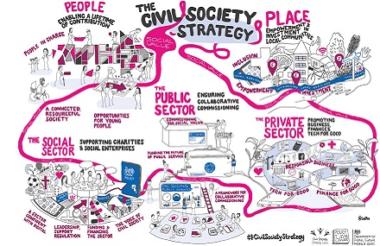The government makes a significant number of commitments in its Civil Society Strategy, published today. Many of these have been announced previously and are already under way but the strategy does bring them together in one place and commit to a review in two years' time.
Here are the key commitments for charities.
Social sector
The government has made a renewed commitment to encourage charities to speak up. It says “government should improve its engagement with civil society, consult charities, and community groups,” and that it is “determined that charities and social enterprises should be fully confident in their right to speak in public debates, and to have a strong campaigning and advocacy role”.
It added: “It is right that we have government grant standards which prevent taxpayers’ money being spent on political campaigning or lobbying. However, simply being in receipt of taxpayers’ money should not inhibit charities from making their voices heard on matters of policy or practice.
The document reiterates the government’s commitment to working with the Electoral Commission on fresh guidance for charities.
It says it will “renew its commitment to the principles of the Compact” which was last published in 2010.
Government will set up a cross-government civil society group to “establish the principles of effective engagement in the policymaking process, learning from the examples of good practice that already exist. This includes a focus on the effective engagement of young people”.
Funding
The government has said it wants to make it easier for charities, particularly smaller ones to find funding and will “explore opportunities, working with sector partners, to make access to funding and finance easier” and that “this will include exploring the potential of technology”.
The government is also committed to supporting the development of enterprise activity to grow and diversify income, and improving access to social investment for charities and social enterprises through a £60 million endowment to Access (The Foundation for Social Investment)
The government has said it will continue to support repayable finance projects, and will work with the Charity Commission and UK Community Foundations to release at least £20m over the next two years from inactive charitable trusts to grassroots community organisations
It has said it will explore how to encourage more “collective giving, a collaborative, peer-influenced form of philanthropy that has the potential to develop larger funds to tackle problems” and “will invest over £750,000 before 2020 in the growth of place-based giving schemes, to support civic philanthropy.”
Tax and regulation
The government has committed to a review of Social Investment Tax Relief in 2019. It will establish a regular forum for social enterprises to coordinate relations with the government, and will “develop and implement measures to strengthen safeguarding”.
It will also review the “operation and impact” of the Fundraising Regulator, and work with the Charity Commission to “to explore options for placing it on a secure and sustainable financial footing and ensuring it is adequately resourced to meet future challenges”.
Leadership
Government has said it will “convene key civil society stakeholders over the next year, to explore the potential for a common vision and mission for strengthening the leadership of social sector organisations and the potential for specific government interventions”.
It will explore ways to diversify trusteeship with the Charity Commission and charities and “agree on collective action”.
Government will also “convene key stakeholders to explore how we can collectively help to develop strong local support systems for social sector organisations”.
Digital
The government has said digital techology is fundamentally transforming how society operates, that it is “essential for the social sector to be part of the digital revolution” and that it will try and bring the two together.
It said: “To ensure our communities are connected, the government will implement measures from the Digital Economy Act. This will support civil society organisations and their beneficiaries in accessing high quality, fast, digital services.”
There will be a Digital Skills Partnership to help civil society organisations to build their skills, boosting collaboration between the government, civil society, and business to tackle the digital skills gap.
The government has also said it will continue to support the establishment of the Local Digital Skills Partnerships, which bring together stakeholders from local government, civil society, and business to address digital skills gaps and increase digital inclusion.
Government will support the development of an effective Charity Digital Code of Practice for charity leaders and trustees. It will also work with sector partners to deliver a #DigitalTrustees campaign “to promote digital confidence on charity boards”.
Public sector
Government will “support the spread of ‘citizen commissioners’” who are local people making decisions about the services they need and government will share learning from co-design projects.
The government has said also said it will continue to support growth and build evidence base for social impact bonds through the Centre for Social Impact Bonds.
Grants 2.0
The government said it wants to “broaden the range of funding options for community initiatives” which includes a “revival of grantmaking”.
It “recommends that all public bodies, including local government, follow the Grants Functional Standard”.
It will also support open data initiatives and hold a “ministerial event” to “collectively improve data infrastructure and open data publication to support civil society”.
There will be new guidance for commissioners.
Flexible contracting
The document says “all central government commercial buyers will be required to undertake training on how to take account of social value in commissioning and procurement”
The Crown Representative will run an awareness campaign to encourage people to use the contracts finder service.
Government will review the Innovation Partnerships model to “explore whether more can be done to encourage contracting authorities to work directly with partners”.
Strengthening the Social Value Act
The government has reiterated the announcement that government departments “will be expected to apply the terms of the Act to goods and works and to ‘account for’ the social value of new procurements”.
It will explore the potential for the use of social value in grants as well as contracts and the suggestion submitted to this Strategy that the Social Value Act should be applied to other areas of public decision making such as planning and community asset transfer.
It will also set a standard measure for social value.
Enabling a lifetime contribution
The government has said it will explore ways to measure the wellbeing of communities and social value. There will be a biennial public update from DCMS on the strategy
There will be support for community organising programmes. Between 2017 and 2020 another 3,500 people will be trained in community organising through a national network of Social Action Hubs and partnerships with public and social sector organisations.
The government has said it will work with civil society to tackle digital skills gap in communities and support more opportunities to volunteer, particularly for older adults. It will explore how to build on existing programmes such as the Place Based Social Action programme and the Communities Fund.
Youth services
The government has committed to continued investment in National Citizen Service. It will also review the guidance which sets out the statutory duty placed on local authorities to provide appropriate local youth services it expects “that the review will provide greater clarity of government’s expectations, including the value added by good youth work”.
And it will set up a Civil Society Youth Steering Group within DCMS “to oversee the development and implementation of policies affecting young people” and a set up a national Young Commissioners and Inspectors Group to “involve young people directly and meaningfully in the commissioning, monitoring and evaluation of national programmes affecting young people”
Places and local communities
The government will explore with the National Association of Local Councils and others the option for local ‘charters’ between a principal council, local councils, and community groups setting out respective responsibilities. There will be an Innovation in Democracy programme to pilot participatory democracy approaches
The government will issue revised guidance to help communities take ownership of local assets. It will signpost support and advice available to communities to improve and shape where they live through the new Community Guide to Action and the MyCommunity website.
DCMS and the Ministry of Housing, Community and local government will design a programme to look at barriers and opportunities for community hubs and launch pilot projects later this year. MHCLG is also exploring the potential of transfers of public land to community-led housing initiatives, such as Community Land Trusts.
Government also intends to consult widely on the design of the UK Shared Prosperity Fund this year, and there will be “opportunities for civil society and communities to consider their role in supporting inclusive growth and driving productivity”.
The government will continue work to consider additional measures it could take to unlock and boost social impact investment. It will work with Big Society Capital and others to develop “new models of community funding, which bring together social impact investment with philanthropic funding, crowdfunding, community shares and corporate investment to create substantial place-based investment programmes”.
Private sector
The government will publish an update on next steps for the Inclusive Economy Partnership by the end of 2018. The Cabinet Office and the Government Inclusive Economy Unit will “build on early experience of the Inclusive Economy Partnership, by working with business and civil society leaders to increase the impact on the challenges it is helping to solve through cross-sectoral partnerships”.
The Inclusive Economy Unit will “lead cross-government work to follow up the relevant recommendations from the advisory group on growing a culture of social impact investment in the UK, including further consideration of business transparency on social and environmental contributions, in the UK and internationally”.
Big Society Capital will focus its strategy on providing homes for people in need, supporting communities to improve lives, and investment in early action to prevent social problems.
Related articles











